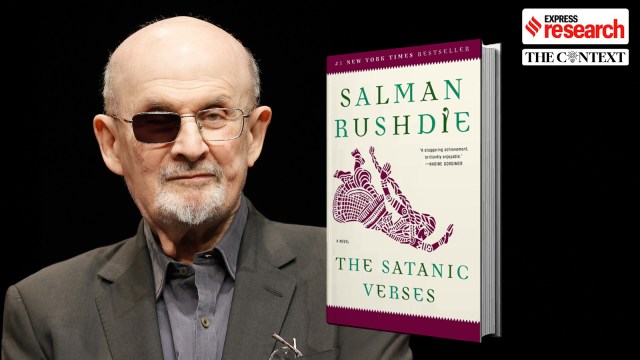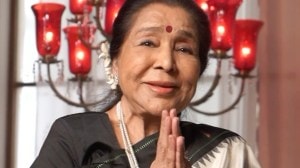Storm of controversies across globe: As ‘Satanic Verses’ appears for sale in Delhi, a look at how it was first received
Amid pressure from several religious groups and politicians, India under Rajiv Gandhi had been the first country to ban ‘The Satanic Verses’ by regulating its import in 1988
 Salman Rushdie's Satanic Verses generated significant controversy when it was released in 1988
Salman Rushdie's Satanic Verses generated significant controversy when it was released in 1988For more than three decades, Salman Rushdie’s The Satanic Verses remained absent from the bookshelves in India where the author was born. This week, that silence was broken. The novel, long shrouded in bans and controversy, has appeared for sale at Bahrisons Booksellers in New Delhi.
The plot
The Satanic Verses, first published in 1988, triggered outrage among Islamic groups worldwide for its provocative reimagining of religious history. Early in the book, a dream sequence recounts a prophet (named Mahound) in an Arabian desert, grappling with revelations from the angel Gabriel. Mahound, attempting to court favour with the powerful, entertains a compromise: integrating three local goddesses into his nascent monotheistic faith.
Run-ins with the Gandhi family and ban in India
Even before the publication of The Satanic Verses, Rushdie’s books had courted controversy. In Mr Rushdie and Mrs Gandhi (1996), historian Katherine Frank argues that Rushdie and Indira Gandhi became “public enemies” following the release of his book Midnight’s Children in 1981.
Three years later, Indira sued him for libel in the London High Court. The charge was that a character in the book, referred to just as ‘the widow’, was based on Indira and portrayed her as a violent and genocidal leader responsible for castrating the poor and torturing young children. However, as Frank writes, it was not those character assassinations that Indira took offence to. Rather, it was one single line in the book where her fictional son ‘Labia Lips’ accused her of neglecting his father, eventually resulting in his death. The line has since been removed from the book.
Rushdie’s feud with the Gandhis only intensified over time. Frank writes, “For Rushdie, (Indira) Gandhi’s cardinal sin was the Emergency she imposed in 1975, when civil rights were suspended, opposition leaders and thousands of political prisoners jailed, slums ruthlessly cleared, and a notorious program of sterilization implemented by Gandhi’s heir apparent, her son Sanjay.”
Rushdie continued to criticise the Gandhis in books and essays. In Imaginary Homelands (1992), he reflects upon Indira Gandhi’s assassination, noting that it was a sad moment for the country but also “time for India to assert, and for its ruling party to demonstrate, that the nation is not owned by one family, no matter how illustrious.”
When Satanic Verses was published in 1988, Rushdie’s history with Indira’s son Rajiv Gandhi, who became the prime minister in 1984 following her assassination, was already fraught. After the book was released, riots erupted across India. Tensions were already high following the Shah Bano case of 1985 when Rajiv was accused of pacifying religious sentiments.
Amid pressure from several religious groups and politicians, India under Rajiv Gandhi became the first country to ban the book by regulating its import. In an open letter, Rushdie criticised the move, writing, “that the Government should have given in to such (extremist) fires is profoundly disturbing.”
Controversies and violence in other parts of the world
By November 1988, The Satanic Verses had faced bans in Bangladesh, Sudan, and South Africa, with Sri Lanka joining the list by December of that year. The wave of prohibitions continued into 1989, as Malaysia imposed its ban in March, quickly followed by Brunei.
In Britain, the backlash erupted into public protests. On December 2, 1988, 7,000 Muslims staged the first demonstration against the novel in the town of Bolton. After Friday prayers, a portion of the congregation from the Deobandi-run Zakariyya Jame Masjid marched to the town centre, where they publicly burned the book. When the US edition was released in February 1989, it reignited criticism, sparking a fresh wave of reviews and renewed controversy. By March, more countries followed suit, with the book banned in Kenya, Thailand, Tanzania, Indonesia, and Singapore.
Globally, the backlash turned violent. The book’s Japanese translator was murdered; its Norwegian publisher was shot. In Turkey, 37 people perished in an arson attack tied to its publication.
Iran’s Ayatollah Khomeini issued a fatwa in 1989 calling for Rushdie’s death. The author went into hiding for years with his then-wife, Marianne Wiggins, reporting that in the first few months following the fatwa, the couple moved 56 times, once every three days.
The fatwa also caused a diplomatic controversy. Iran announced a bounty of $6 million to anyone willing to kill Rushdie. This, in turn, prompted the British government to offer him police protection for the next nine years. In 1989, Iran broke off diplomatic relations with England. Its Prime Minister Mir Hossein Mousavi later said that “by defending Salman Rushdie and his blasphemous book, Britain once again displayed its animosity toward Islam.”
More recently, the spectre of that violence reappeared. In August 2022, Rushdie was stabbed on stage at an event in upstate New York, as he came out of hiding to discuss protecting writers from harm. The assailant struck with a knife, delivering a flurry of blows in just 27 seconds.
In his searing and unflinching memoir, Knife: Meditations After an Attempted Murder, Rushdie recounts the harrowing attack that nearly took his life. His would-be assassin, Hadi Matar, appeared woefully uninformed about his target. “From this, we can deduce that, whatever the attack was about, it wasn’t about The Satanic Verses,” Rushdie writes.
Years after the fatwa and the uproar surrounding his most infamous novel, Rushdie does not defend either the book or himself. “If anyone’s looking for remorse,” he declares early in the memoir, “you can stop reading right here.”



- 01
- 02
- 03
- 04
- 05




























